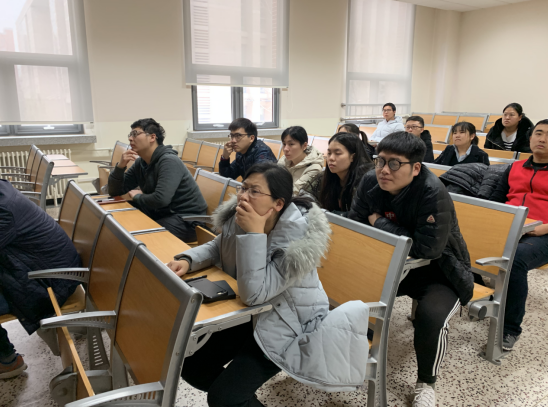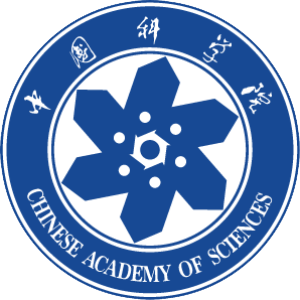-
 Professor Sun Yanming's "Research on High-Performance Organic Solar Cells" Lecture
Professor Sun Yanming's "Research on High-Performance Organic Solar Cells" LectureOn the morning of December 27, 2021, Professor Sun Yanming was invited by Professor Huang Hui from the School of Materials Science and Optoelectronic Technology to give a lecture on the theme of "High-Performance Organic Solar Cell Research" at Jiao 1-115.

Prof. Yanming Sun first introduced the research status of organic solar cells, and pointed out that the construction of nanoscale interpenetrating network bulk heterostructures is the key to the preparation of high-efficiency organic solar cells, and it is very challenging to construct an ideal bulk heterostructure. Then Mr. Sun described a new strategy, namely "fiber network strategy" to regulate phase separation, that is to use the fibrous structure of polymer donors to build a morphological framework and form a hole transport network. , large area and semi-transparent devices also have important applications. Finally, a recent work of his research group is introduced. Using the traditional branched side chain substitution strategy, the molecular packing of non-fullerene acceptor molecules has been optimized, and the morphology of multi-scale blended films has been constructed. An organic solar cell with a device efficiency of up to 18.32%, a voltage loss of 0.55 V and a fill factor of 81.5%.

Sun Yanming, School of Chemistry, Beihang University, professor and doctoral supervisor. In 2002, he graduated from the School of Chemistry, Shandong University. In 2007, he received his Ph.D. in physical chemistry from the Institute of Chemistry, Chinese Academy of Sciences. After that, he did postdoctoral research at the University of Manchester in the United Kingdom and the University of California, Santa Barbara in the United States. In September 2013, he returned to Beijing University of Aeronautics and Astronautics to work full-time. In 2018, it was approved by the National Science Fund for Distinguished Young Scholars. In 2019, he was selected as a Clarivate Analytics Global Highly Cited Scientist. He has been engaged in the research of organic optoelectronic functional materials and devices for a long time, and proposed a new strategy for regulating the phase separation of the active layer of organic solar cells by fiber network. Published more than 120 SCI papers in Nat. Mater., Nat. Commun., J. Am. Chem. Soc., Angew. Chem. Int. Ed., Adv. Mater. and other journals. His papers have been cited more than 13,000 times by Nature, Science and other journals, and many papers have been cited more than 1,000 times; in 2017 and 2018, he organized special issues on Macromol. Rapid Comm. and J. Energy Chem. as a guest editor respectively.
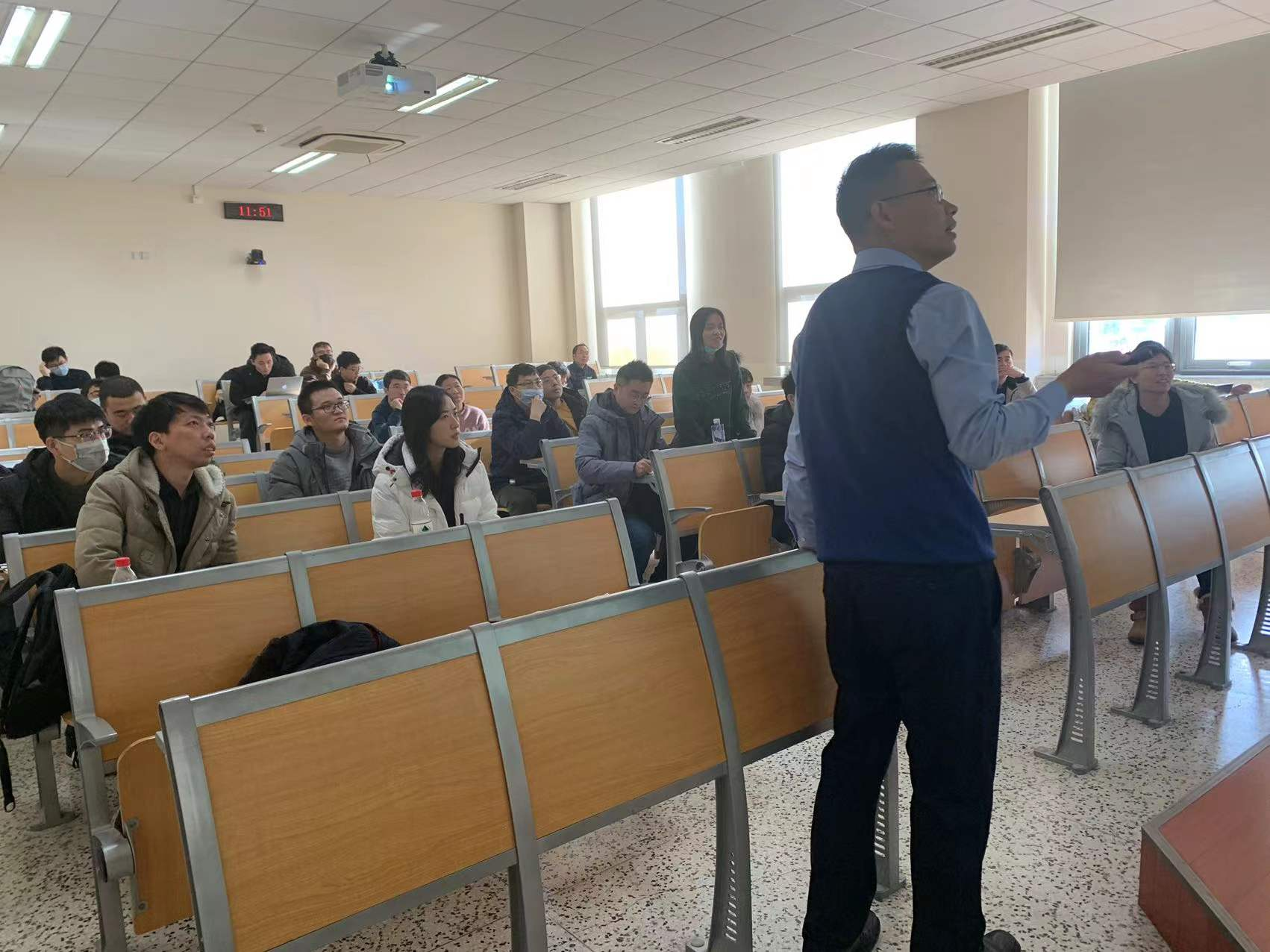
-
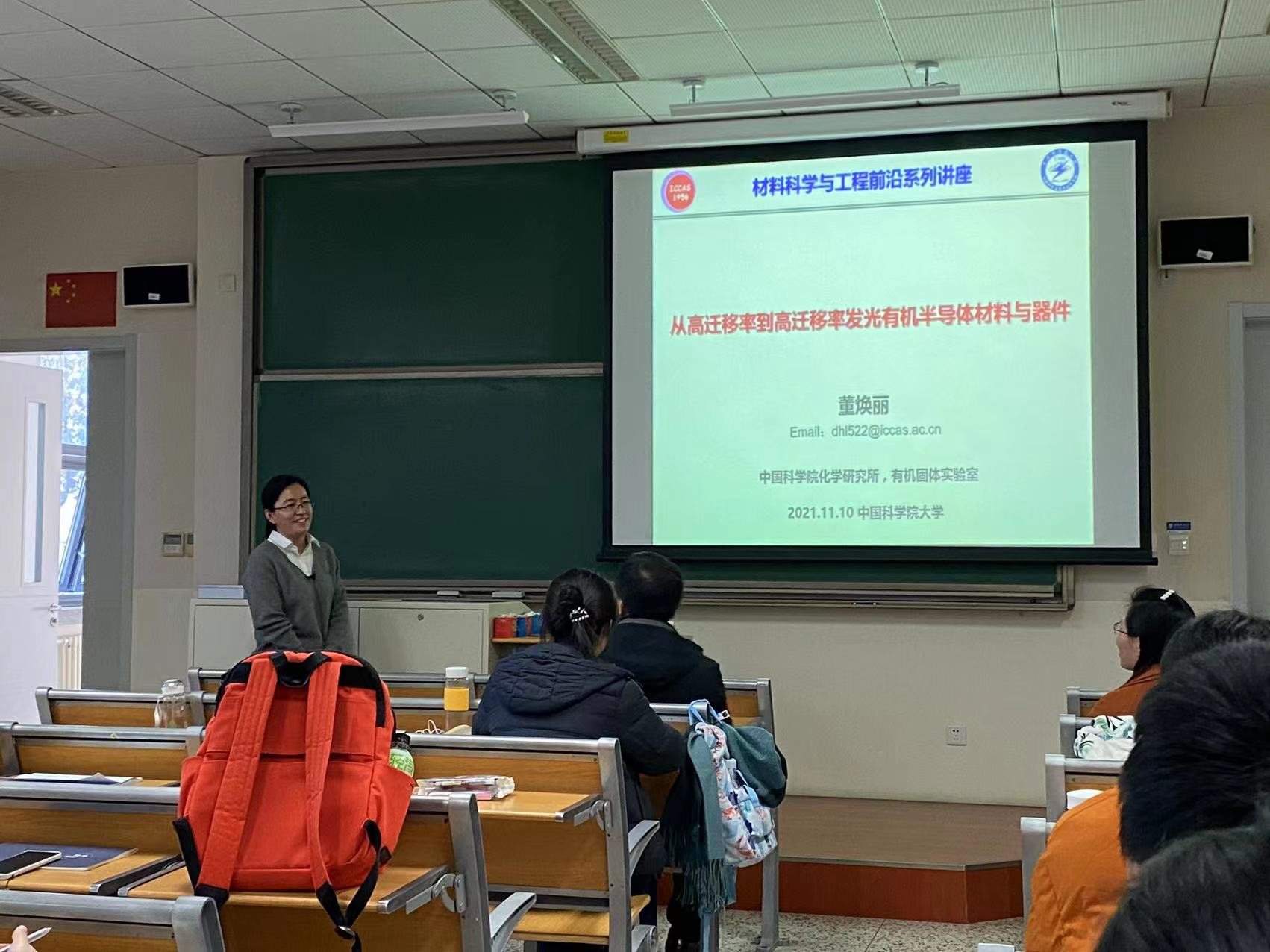 Lecture on "From High Mobility to High Mobility Light Emitting Organic Semiconductor Materials and Devices" by Prof. Dong Huanli
Lecture on "From High Mobility to High Mobility Light Emitting Organic Semiconductor Materials and Devices" by Prof. Dong HuanliOn the afternoon of November 10, 2021, researcher Dong Huanli was invited by Professor Huang Hui from the School of Materials Science and Optoelectronic Technology to give a lecture on "From High Mobility to High Mobility Light-Emitting Organic Semiconductor Materials and Devices" at Jiao 1-114 .

Organic field effect transistors using organic molecular materials as semiconductor layers are the basic building blocks of large-area flexible organic circuits due to their molecular designability, easy performance regulation, ease of processing, and good flexibility. A research platform for functional devices. The construction of high-performance organic field effect transistors is of great significance for promoting its device application research and functional integration device construction. In this lecture, researcher Dong Huanli first briefly introduced the entire development process of organic semiconductor materials, and focused on field effect transistors to describe some explorations carried out by his research group in realizing high-performance organic field effect transistors and organic light-emitting field effect transistor devices. Research, including the design and synthesis of organic field-effect materials, the control of aggregate state structure and device construction.
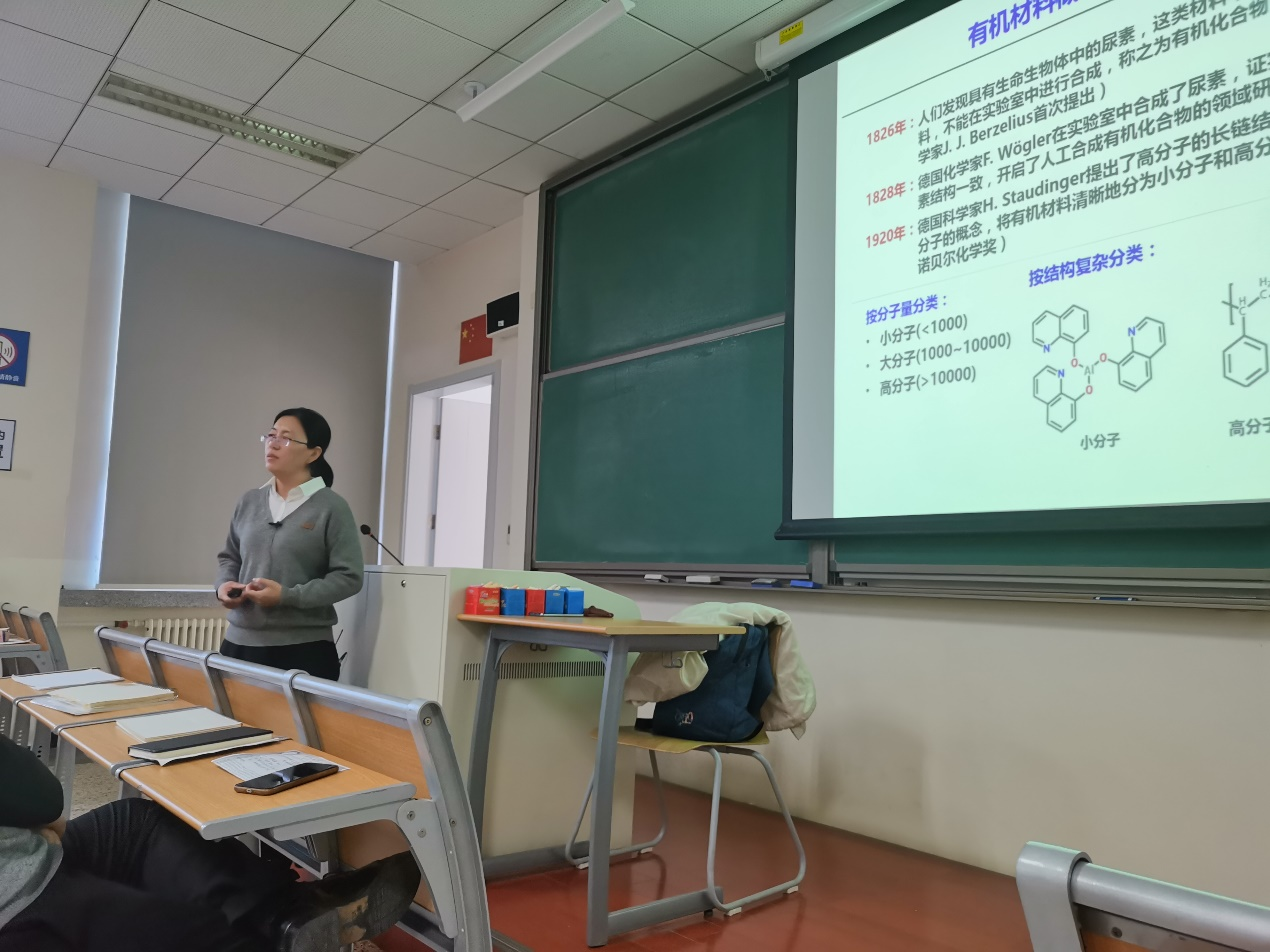
Dong Huanli is currently a researcher, doctoral supervisor and research group leader at the Institute of Chemistry, Chinese Academy of Sciences. He has been devoted to the research of organic optoelectronic functional materials and devices for a long time, including multi-scale aggregation structure regulation and performance research; conjugated polymer crystals and devices; multifunctional organic semiconductor materials and devices. At present, he has published more than 200 SCI papers in Nat. Chem., Nat. Commun., J. Am. Chem. Soc., Angew. Chem. Int. Ed., Adv. Mater., etc., and has been cited by SCI more than 10,000 times. The first batch of members of the Youth Innovation Promotion Association of the Chinese Academy of Sciences (excellent in 2015), and successively won the Youth Chemistry Award of the Chinese Chemical Society (2014) and the second prize of the National Natural Science Award (5/5, 2016). He is currently the editorial board member and youth editorial board member of Journal of Chemistry in Higher Education Institutions, China Chemistry Letters, The Innovation, and Structural Chemistry.
-
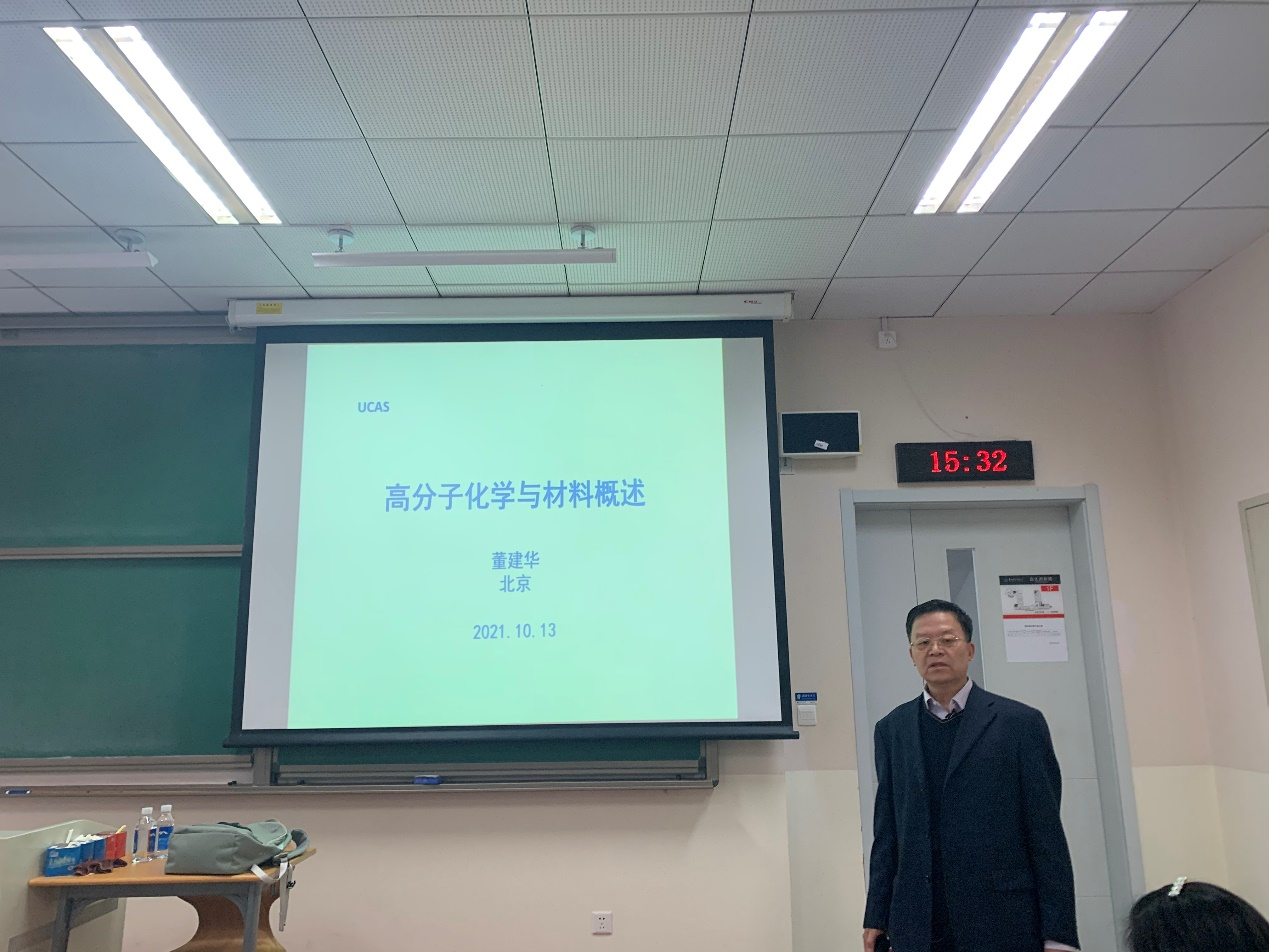 Professor Dong Jianhua's lecture on "Overview of Polymer Chemistry and Materials"
Professor Dong Jianhua's lecture on "Overview of Polymer Chemistry and Materials"On the afternoon of October 13, 2021, Professor Dong Jianhua was invited by Professor Huang Hui from the School of Materials Science and Optoelectronic Technology to give a lecture on "Overview of Polymer Chemistry and Materials" at Jiao 1-114.
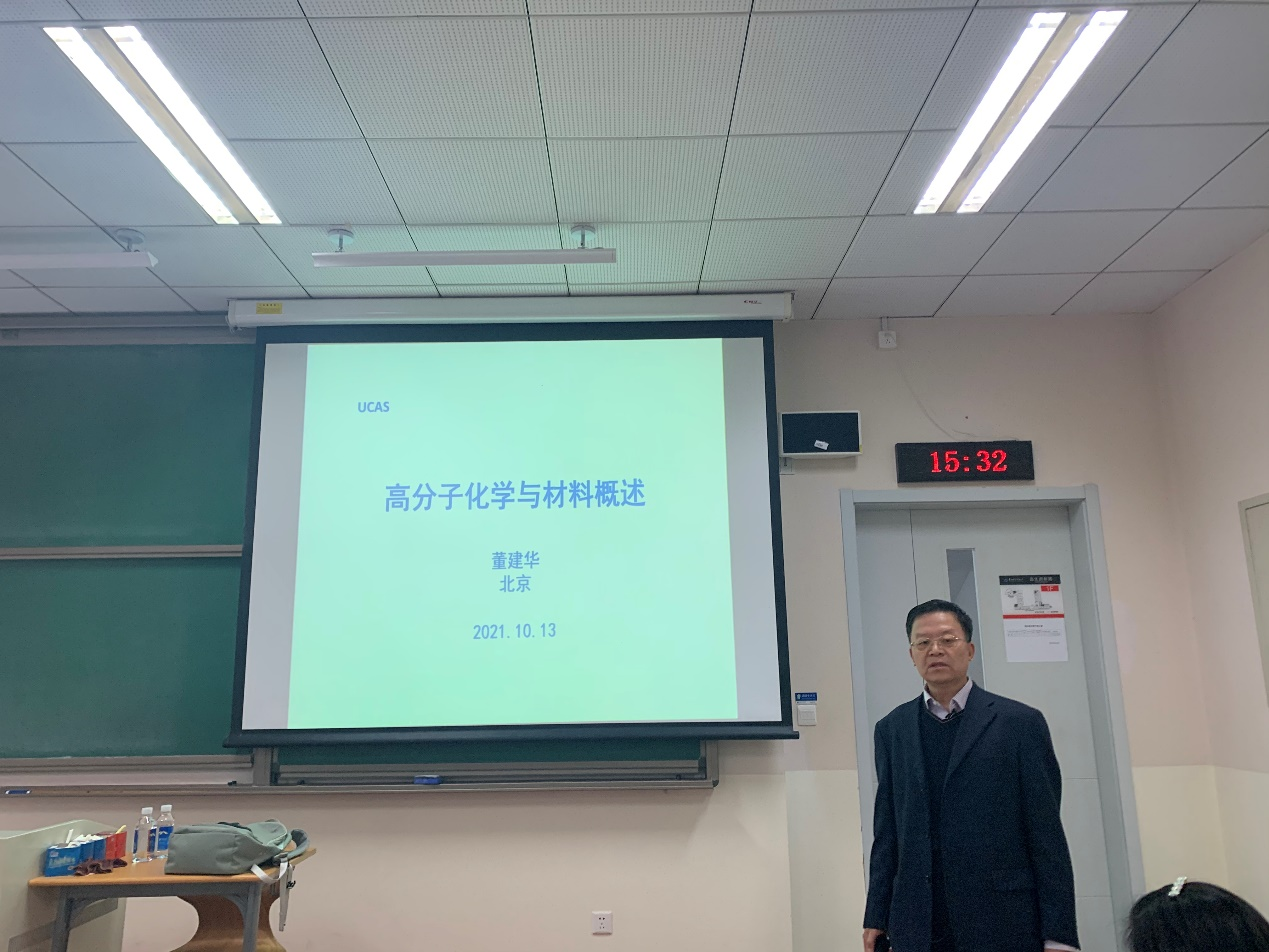
Macromolecular compounds are macromolecular substances. Polymer compounds are used as materials in various fields of people's production and life, and people's clothing, food, housing and transportation are inseparable from polymer materials. Many aspects of industrial and agricultural production, medical health, information technology, aerospace, and national defense industries are fields where polymer materials play an irreplaceable role, and new demands are constantly put forward for polymer materials. This report provides an overview of the basic knowledge of polymers, the research frontiers of polymer chemistry and materials, etc. Professor Dong first briefly introduced the 100-year development history of polymers, during which new materials with an annual output of 400 million tons were formed. Among them, general polymer materials such as polyolefins dominated, but there was still room for improvement in performance. Then he proposed emerging optoelectronics, biological Medical functional polymers have broad prospects, and environment-friendly, biodegradable polymer materials still need to be developed. The atmosphere of the lecture was good, and the exchanges and discussions between professors and students were active and enthusiastic.
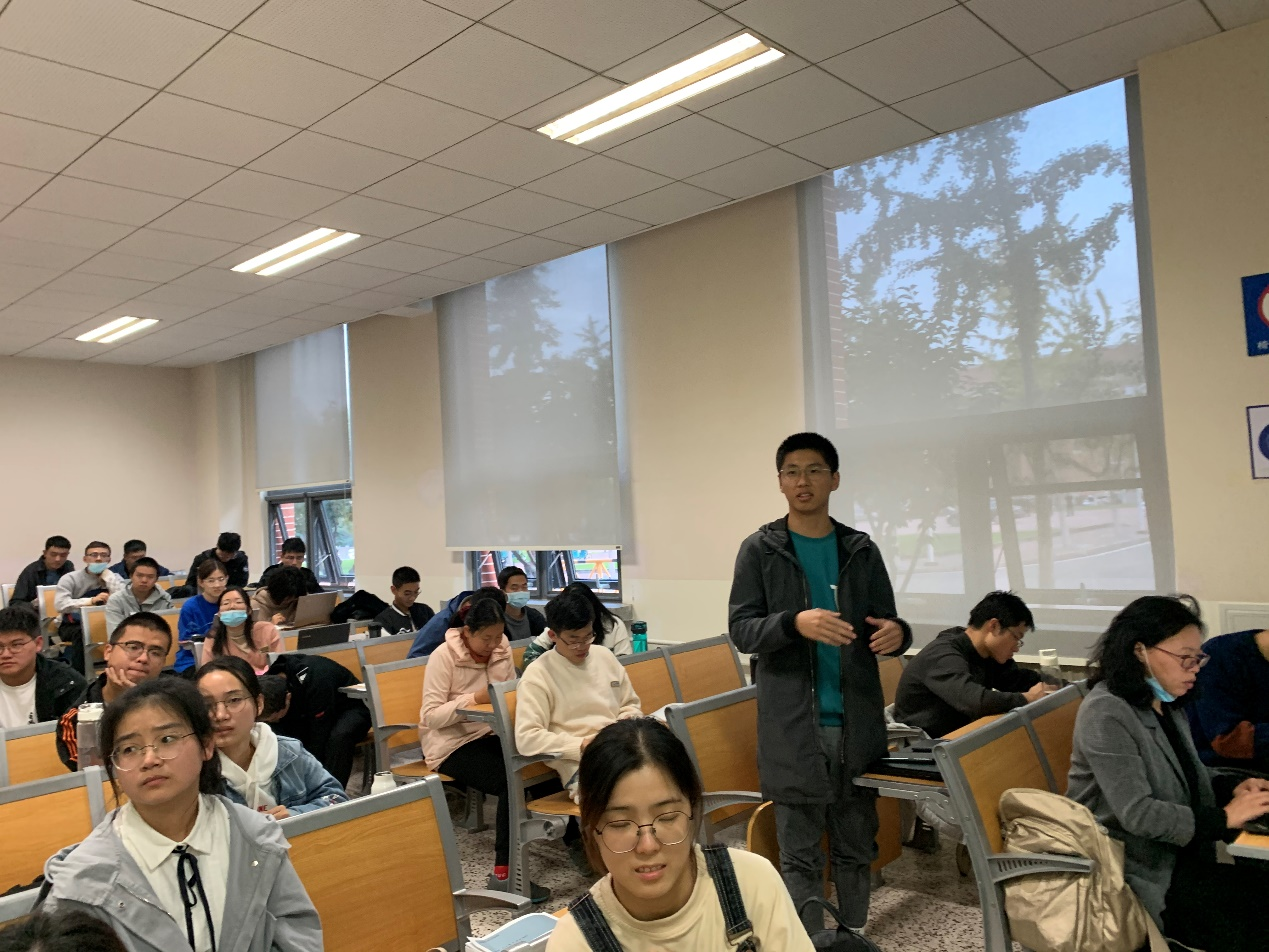
Dong Jianhua, male, graduated from the Department of Chemistry of Zhejiang University in 1982 with a bachelor's degree, and obtained a Ph.D. After two years of postdoctoral research in the Department of Chemistry of Peking University, he stayed on to teach until 1997. From 1998 to 2019, he was in charge of project management in the field of organic polymers at the National Natural Science Foundation of China (retired in June 2019). He has been a researcher since 1999, and has successively served as the director of various science fund projects, director of the science department, and second-level researcher in the fields of organic polymer materials, polymer science, materials chemistry and energy chemistry. He has organized many seminars on the development of disciplines and frontier strategies in the field of organic polymers, as well as major research projects and academic activities in operation and management. Editor-in-chief of three monographs on the frontiers, progress and prospects of the discipline; wrote chapters for related monographs many times.
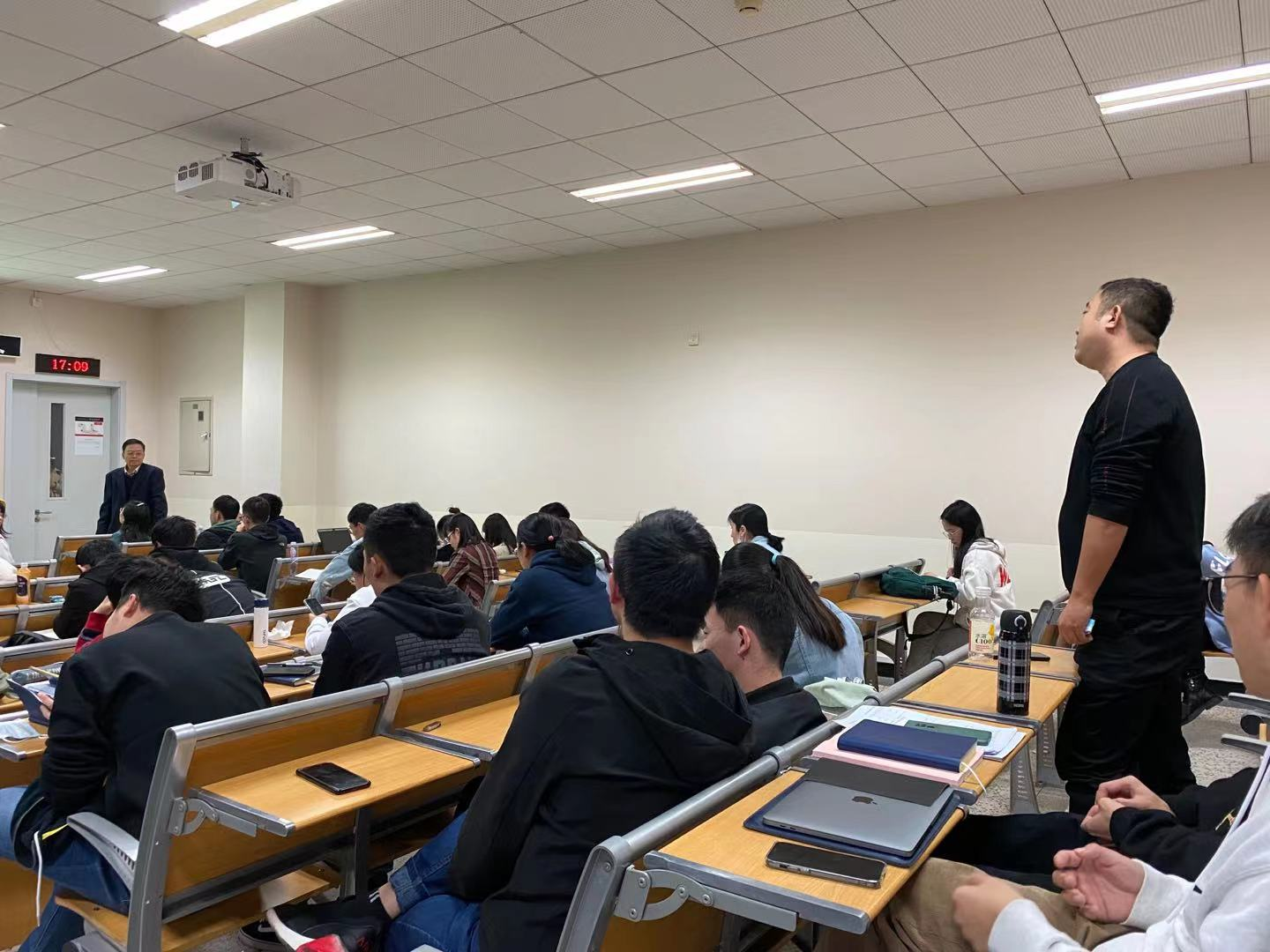
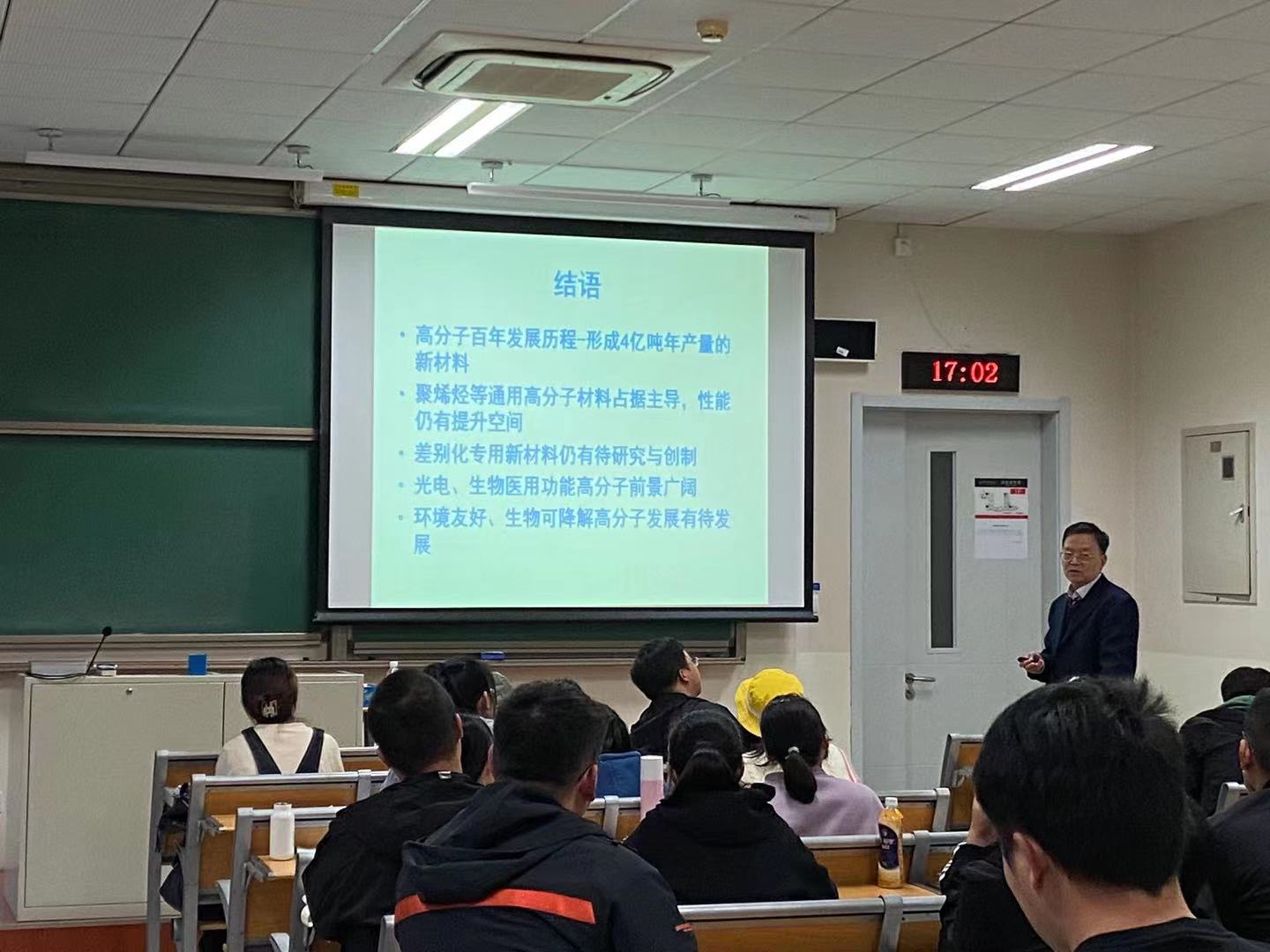
He served as the twenty-sixth director of the Chinese Chemical Society, the executive director of the twenty-eighth and twenty-ninth councils, and served as the deputy director of the Polymer Science Committee for a long time. Deputy Editor-in-Chief of the editorial committee of the polymer field of the third edition of "Encyclopedia of China", and has organized and written scientific dictionaries and disciplinary strategy reports for many times. From 2007 to present, Wiley Publishing Company's international academic journals "Advanced Technology Polymers" "Polymers for Advanced Technologies" Associate Editor (Associate Editors) 2011 to present "Royal Society of Chemistry Polymer Chemistry Series" editorial board member. He is on the editorial board of domestic academic journals such as Polymer Bulletin, Journal of Materials Research, Materials Herald, and Polymer Materials Science and Engineering.
-
 Professor Wan Qing's special report on "Application of Neuromorphic Devices and Brain-like Chips"
Professor Wan Qing's special report on "Application of Neuromorphic Devices and Brain-like Chips"On the morning of September 15, Professor Wan Qing, winner of the National Fund for Distinguished Young Scholars and doctoral supervisor of the School of Electronic Science and Engineering of Nanjing University, was invited by Professor Huang Hui of the School of Materials Science and Technology to give a speech entitled "Neuromorphic Devices and A special report on the application of its brain-like chip. The report will be chaired by Professor Huang Hui.


Professor Wan Qing introduced the significance of developing new concept devices with synaptic and neuron functions from the bottom for the construction of neuromorphic systems and the development of a true "brain-like chip" and the importance of electric double-layer transistors in this field. application prospects. On this basis, Professor Wan Qing introduced his research group's work on the development of ultra-low voltage amorphous oxide electric double layer transistors using interfacial proton electric double layer regulation and exploring its application in the field of neuromorphic electronics. It includes a series of artificial synapses and artificial neural components based on oxide electric double layer transistors, and realizes short/long-term memory, spike time-dependent plasticity (STDP), high-pass filtering, and multi-channel pulse information integration regulation of biological synapses. and neuron algorithms and other functions of bionics. At the end of the report, Professor Wan Qing answered the questions of some teachers and students, and held a forum and discussion with the teachers present on the latest research progress and related issues of new concept devices of neuron function.
Wan Qing, male, born in August 1976, winner of the National Fund for Distinguished Young Scholars, professor/doctoral supervisor of the School of Electronic Science and Engineering, Nanjing University. In 1998, he graduated from the Department of Materials, Zhejiang University. In 2004, he obtained a doctorate degree in electronics from the Shanghai Institute of Microsystems, Academy of Sciences. After that, he worked as a postdoctoral fellow and visiting researcher at the University of Cambridge, the University of Michigan, and Stanford University. After returning to China, he worked in Hunan. The University, the Ningbo Institute of Materials Science of the Academy of Sciences and Nanjing University are engaged in scientific research and teaching. At present, he is mainly engaged in the application research of oxide semiconductors and new concept devices. He has published more than 180 SCI papers in famous journals such as Nature Communications, Advanced Materials, Nano Letters, IEEE Electron Device Letters and Appl. Phys. Letts. more times. He has successively won the Special Award of the President of the Academy of Sciences, the National 100 Excellent Doctoral Dissertations, the First Prize of Natural Science in Zhejiang Province (individually ranked No. 1), the China Youth Science and Technology Award, the "Young Top Talents" Program of the Organization Department of the Central Committee, and the 100 Talents Program of the Academy of Sciences. and other honors and awards.
-
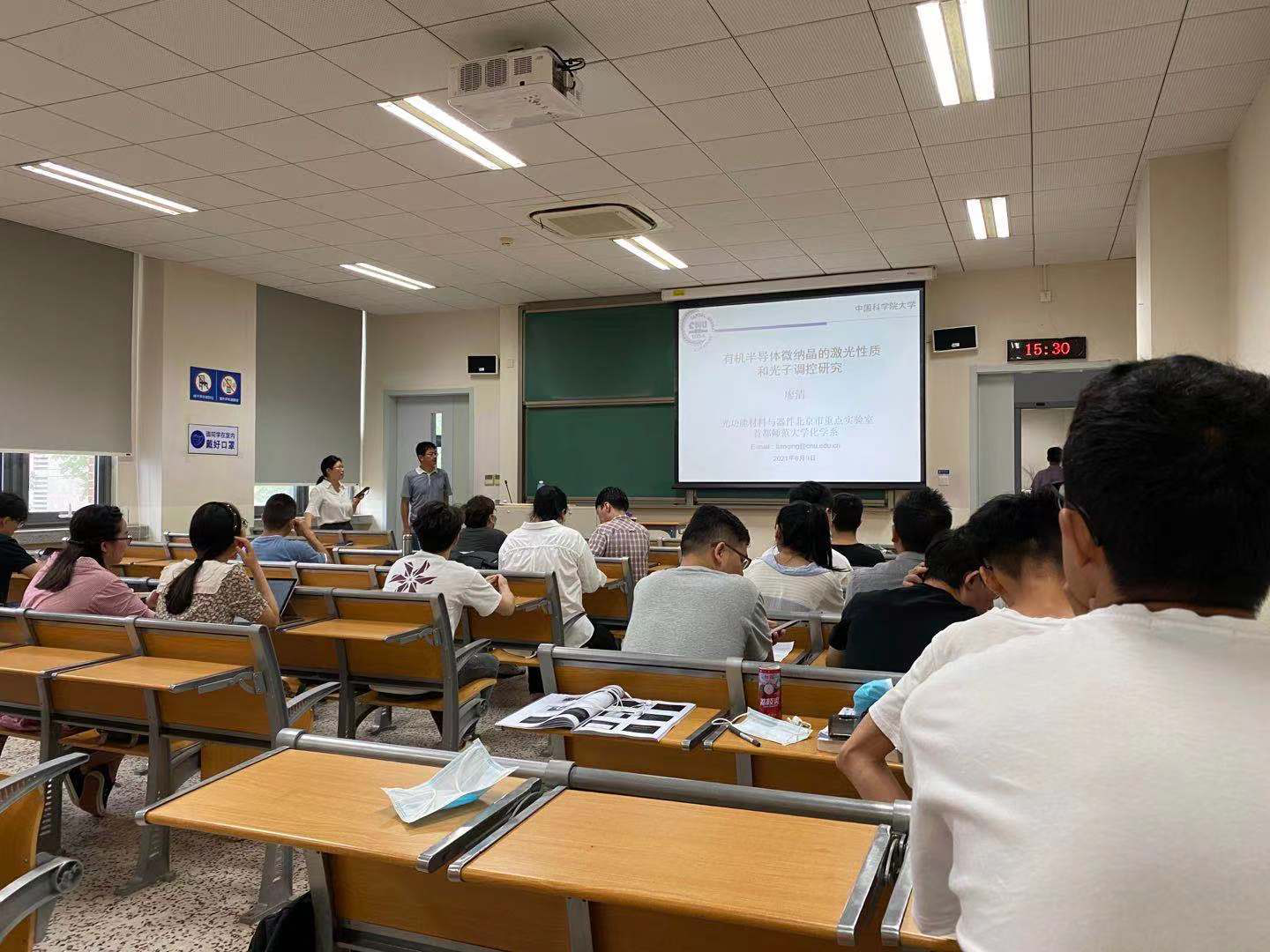 Professor Liao Qing's lecture on "Organic Micro-Nano Laser and Low-Dimensional Photonic Materials"
Professor Liao Qing's lecture on "Organic Micro-Nano Laser and Low-Dimensional Photonic Materials"On the afternoon of June 9, 2021, Professor Liao Qing from the Department of Chemistry of Capital Normal University was invited to the University of Chinese Academy of Sciences to give a lecture on the theme of "Organic Micro-Nano Laser and Low-Dimensional Photonic Materials". The lecture was held in Room 214 of the first teaching building.
Photonics is the science of using photons as information and energy carriers, involving application technologies and devices such as light generation, transmission, detection, amplification and display. Organic photonics materials have received extensive attention due to their advantages in optical properties, flexibility, and processing costs.
In the lecture, Professor Liao Qing clearly introduced the achievements of his team in recent years. The main research direction of the team is "organic micro-nano crystalline materials and devices", and the lecture content is divided into laser in organic micro-crystal micro-cavities In terms of photonic regulation and control, Prof. Qing Liao introduced his team's work on singlet laser materials, triplet-assisted photon lasers and exciton polariton lasers. Finally, we exchanged and discussed with the teachers and students on site from the aspects of the structure, properties and application fields of organic materials, and the current situation of industrial development. The students expressed that they have benefited a lot.

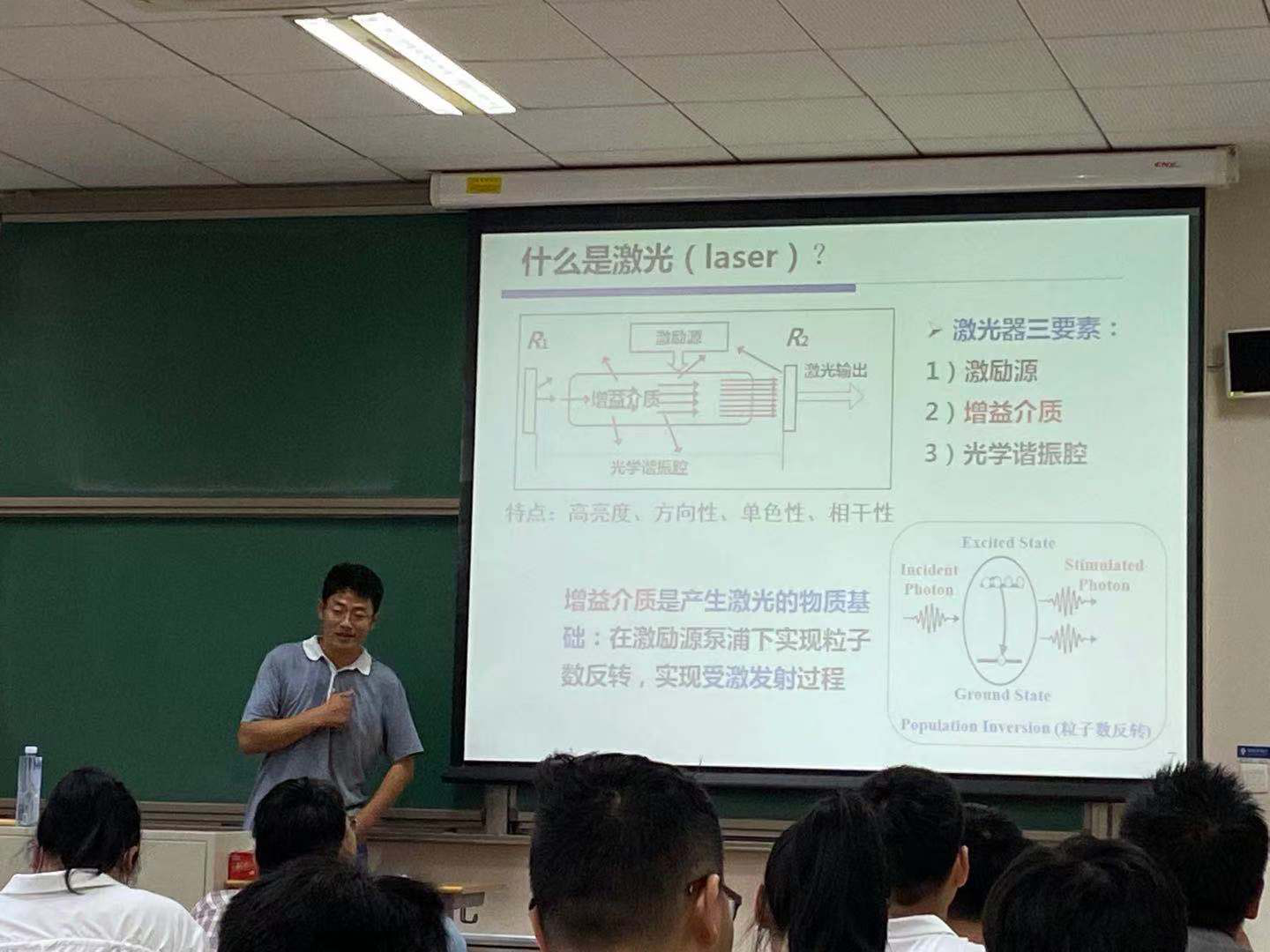
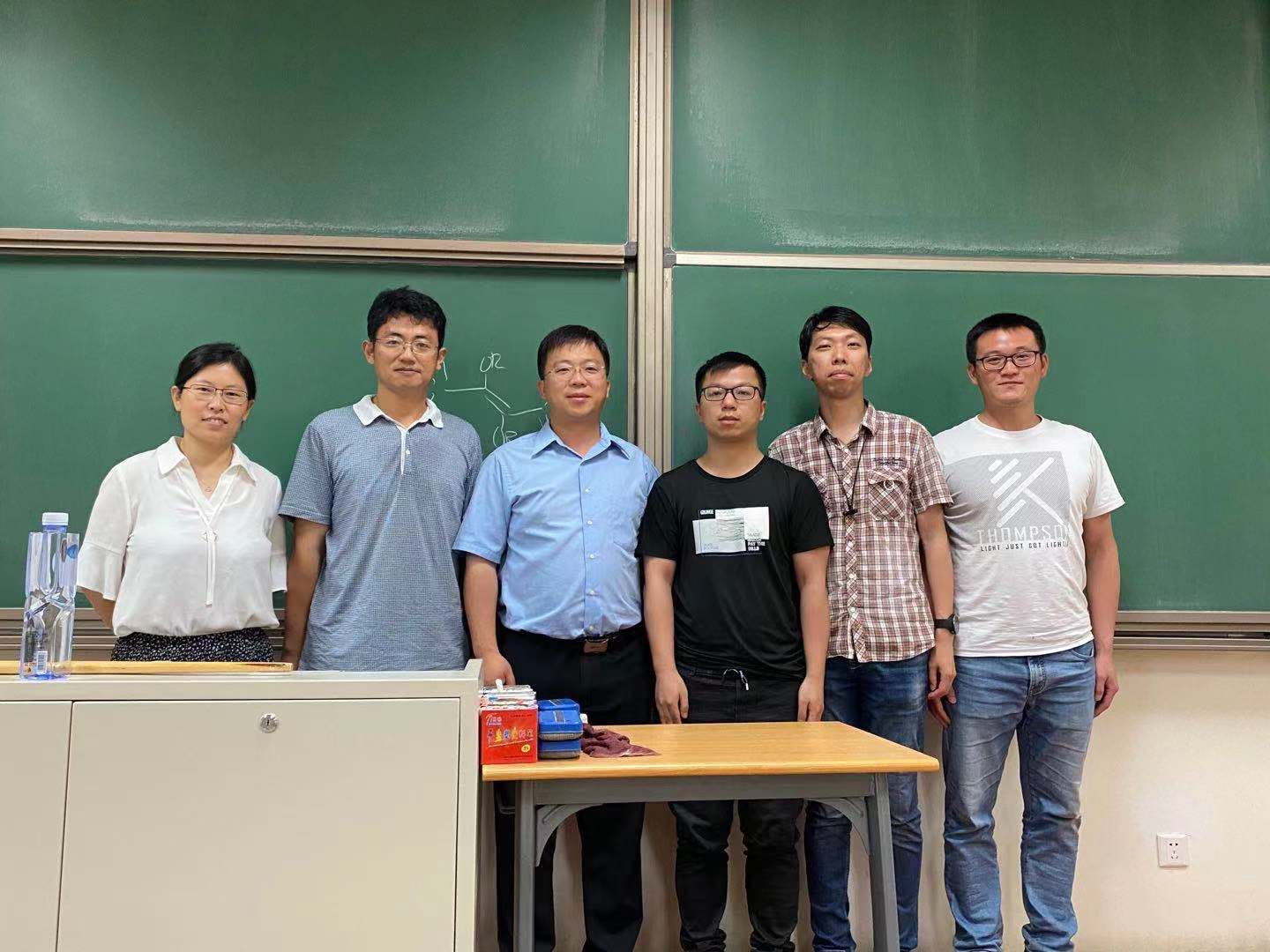
-
 Professor Huang Hui's team participated in the 32nd annual academic meeting of the Chinese Chemical Society
Professor Huang Hui's team participated in the 32nd annual academic meeting of the Chinese Chemical SocietyFrom April 19th to 22nd, 2021, the 32nd Academic Annual Meeting of the Chinese Chemical Society will be held at the Zhuhai International Convention and Exhibition Center. Professor Huang Hui's team, three students (Li Zijie, Wei Yanan, Chen Hao) and two postdoctoral fellows (Zhang Xin, Wen Kaikai), attended the meeting under the leadership of Huang Hui and Shi Qinqin.

With the theme of "Empowering Chemistry, Empowering the Future", this annual meeting has set up 57 academic chapters, 8 thematic forums, and exchanged nearly 8,500 papers. During the annual meeting, a total of 4 special invited reports of the conference, 177 theme reports of the branch, 1477 invited reports of the branch, 1874 oral reports of the branch, and 3924 poster presentations were arranged. More than 10,000 chemical scientists and students, including more than 70 academicians of the two academies, attended the meeting and communicated.
On June 22, Professor Huang Hui, a professor at the University of Chinese Academy of Sciences, who proposed the concept of conformational locks and a research leader, was invited to give an invited report entitled "Some Design Ideas for Organic Solar Cell Materials". From the concept of conformational locks to the science contained in them, and the application of conformational locks in material design, Professor Huang Hui presented a wonderful scientific journey to all the participants, and the participants had a great response.


During the meeting, Mr. Shi Qinqin was invited to give a wonderful oral report, reporting the latest research results, including the activation of C-S bonds and the application of C-S bond activation in organic semiconductor materials. Mr. Shi's wonderful report was affirmed and praised by the participants.
-
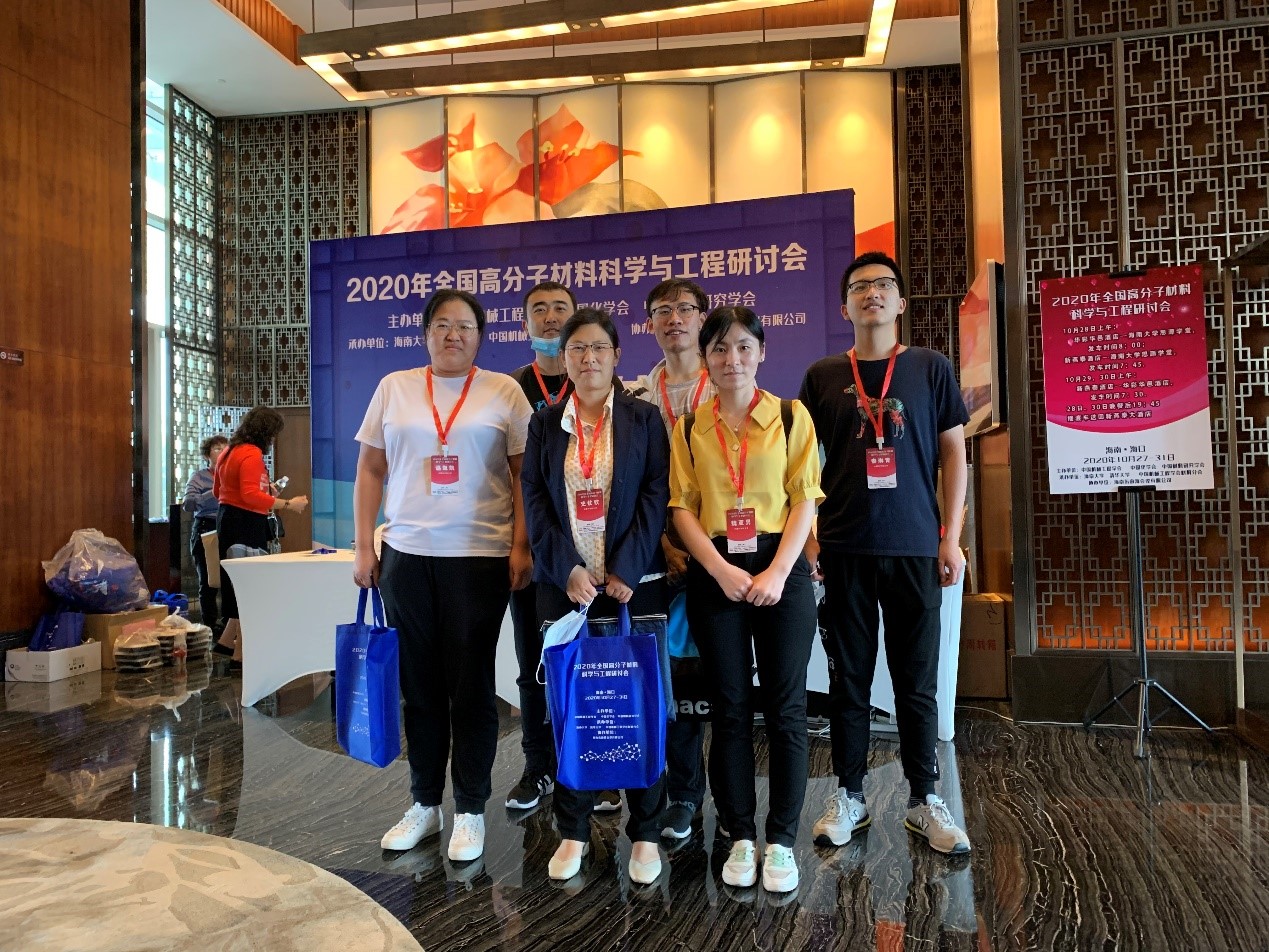 The members of the research group participated in the 2020 National Symposium on Polymer Materials Science and Engineering
The members of the research group participated in the 2020 National Symposium on Polymer Materials Science and EngineeringThe "2020 National Symposium on Polymer Materials Science and Engineering", co-sponsored by the Chinese Chemical Society, the Chinese Mechanical Engineering Society and the Chinese Materials Research Society, and co-organized by Hainan University and Tsinghua University, was held on October 27-31, 2020 in Meili The Coconut City - Haikou City, the capital of Hainan Province, was held. Polymer scholars and engineering technicians from all over the country and overseas have actively participated in this grand meeting of China's polymer materials science and engineering community.

Professor Shi Qinqin of the research group gave an oral report on "Room temperature metal coupling research of conjugated polymers" at the meeting. The oral report after Wen Kaikaibo was titled "Accurately Adjusting Photothermal and Photodynamic Effects of Polymer Nanoparticles by Controlling Polymerization" , the teachers and classmates were very interested in their work and had a heated discussion. Qin Linqing, Wei Yanan and Chen Hao presented their work in the form of posters at the conference, which were all recognized and praised by everyone.
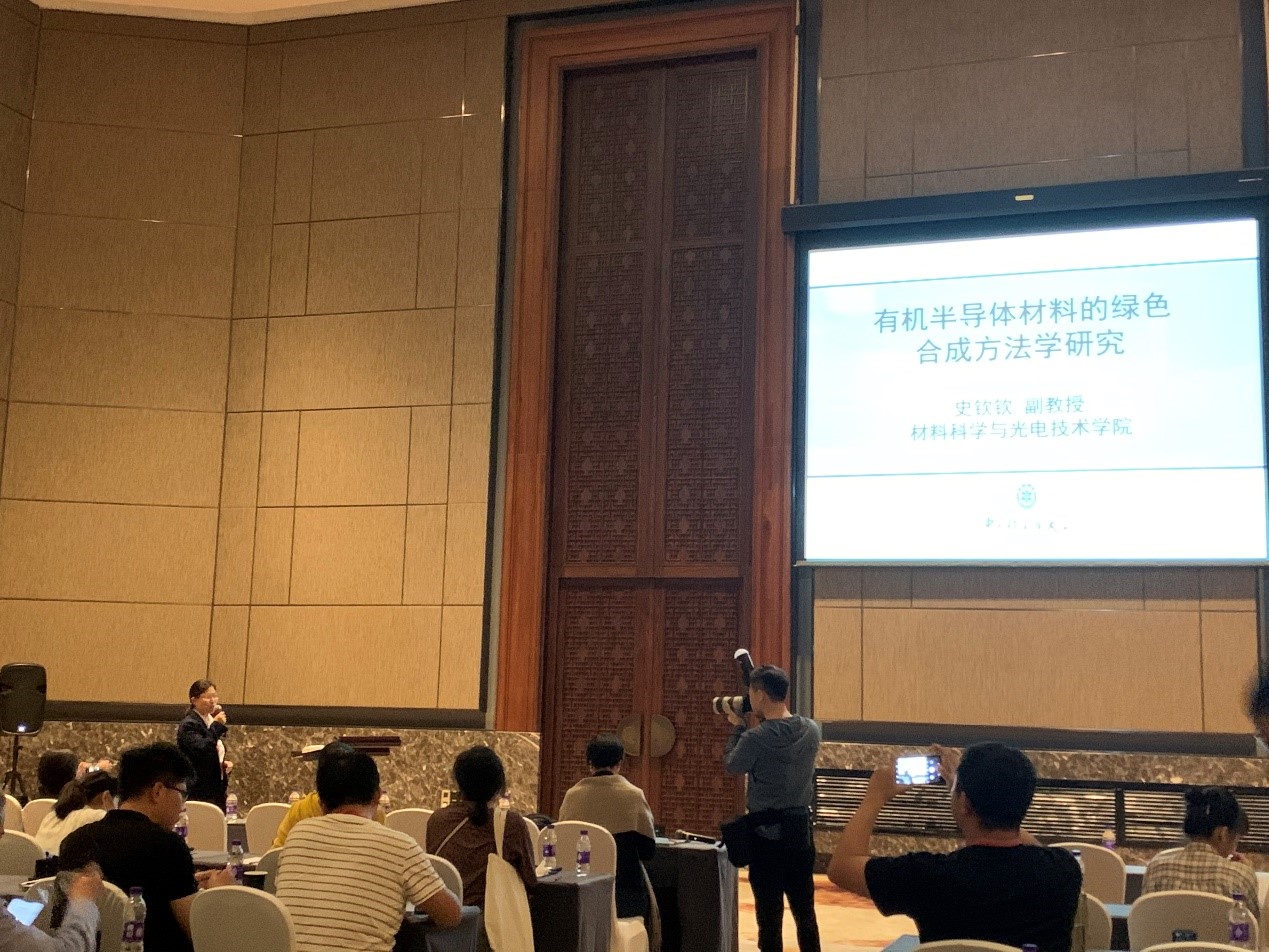
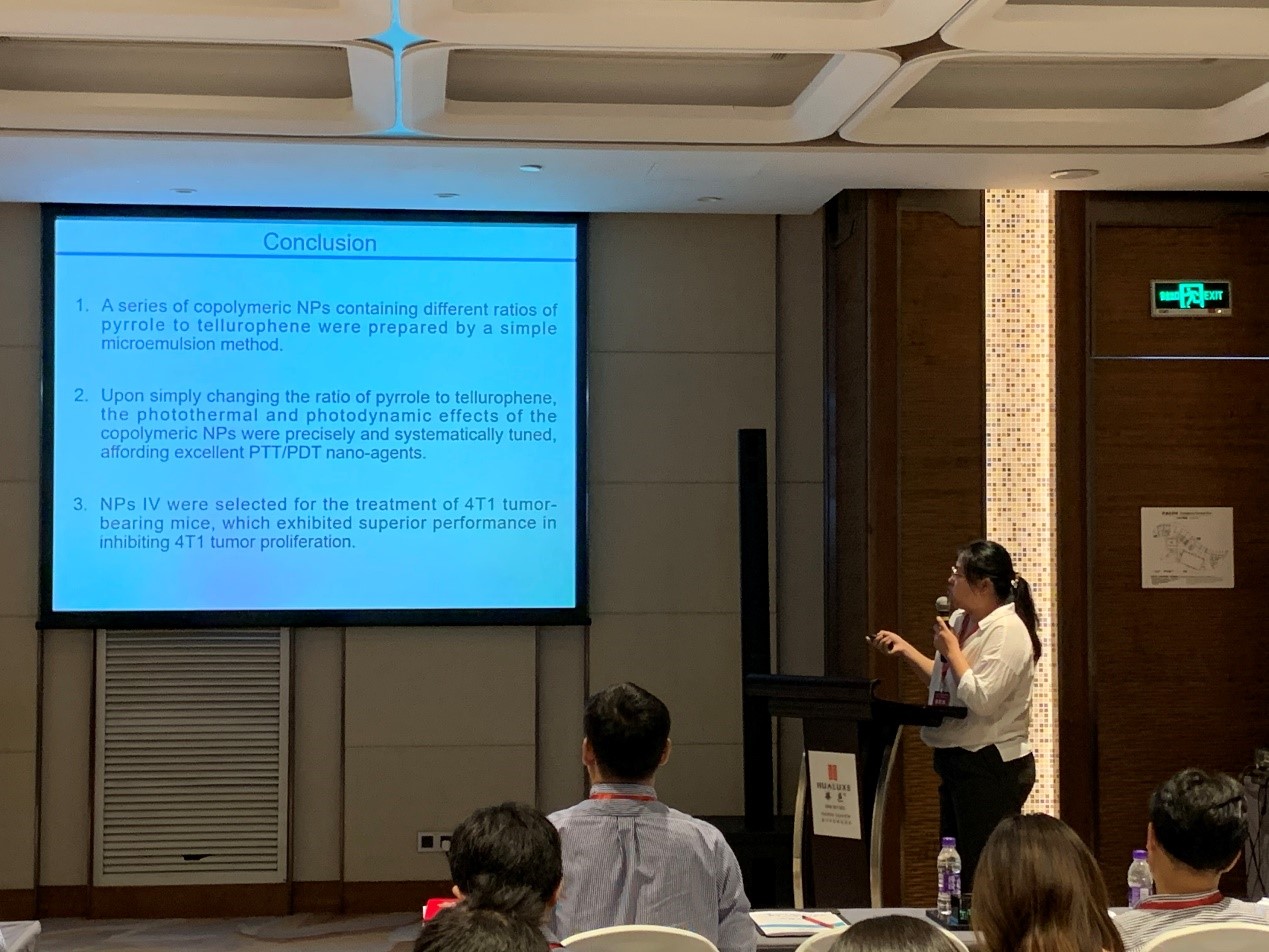
-
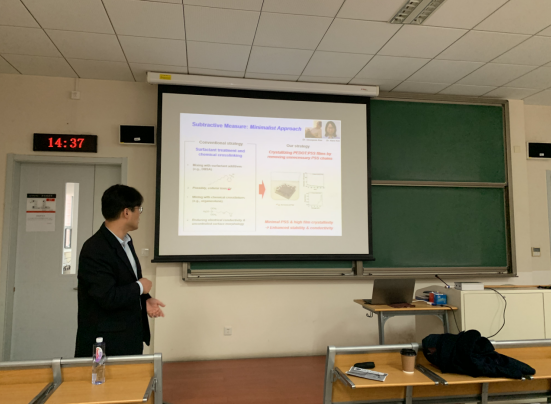 Professor Myung-Han Yoon from the Gwangju Institute of Science and Technology in South Korea made an academic visit
Professor Myung-Han Yoon from the Gwangju Institute of Science and Technology in South Korea made an academic visitAt the invitation of Professor Huang Hui, Professor Myung-Han Yoon of Gwangju Institute of Science and Technology, South Korea, gave an academic report on organic electronic devices in the afternoon of November 22, 2019 at 213, the first floor of the Yanqi Lake Campus.
Organic electronic devices are widely used in our daily life and have become one of the research hotspots in recent years. Professor Myung-Han Yoon gave a brief introduction to the research background of organic electronic devices, expounded the latest research progress and existing problems in this field, and introduced his research work from two aspects. On the one hand, in view of the problems existing in the application of common organic electrolytes such as PMMA and PS in thin-film transistor applications, Professor Myung-Han Yoon proposed the idea of using sulfur-containing polymers as dielectric layers. The sulfur-containing polymer as a dielectric layer exhibits many excellent properties, greatly reducing the leakage current and operating voltage of the device. At the same time, due to the effect of S-S bonds, the device also has the ability of self-healing, which greatly improves the performance of thin film transistors. On the other hand, considering the excellent electrical properties, environmental stability and biocompatibility of PEDOT:PSS Features, Professor Myung-Han Yoon applied it to biosensors. Water-stable electrochemical transistors were fabricated using crystalline PEDOT:PSS films, and the devices exhibited excellent performance, expanding the application of this material in biosensing. Finally, teachers and classmates actively participated in the discussion and exchanged views, which benefited everyone a lot. The report ended successfully with the enthusiastic participation of everyone.

